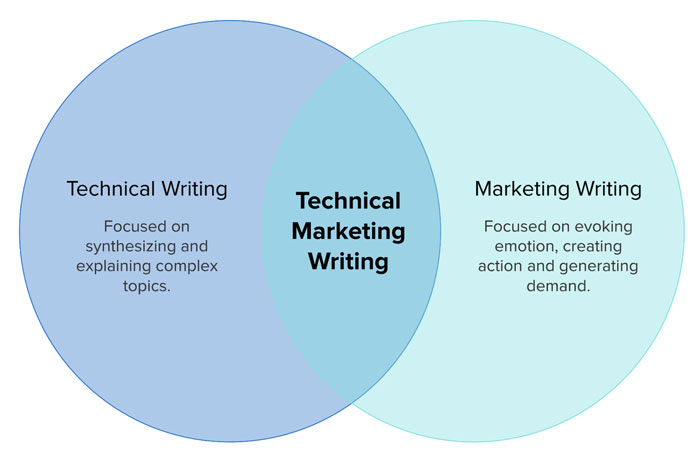B2B content marketing agencies are often asked whether they have “technical writers” on staff. A highly technical product, the thought goes, requires a technical writer to market it. Problem is, technical writing (as it’s commonly defined) is rarely the solution to demand generation and lead generation issues.
In this post, we’ll break down what technical writing really is, how it’s different from content marketing, and where the intersection sits between the two disciplines. To be clear, we’re not throwing shade at technical writers; the world would be a darker, less documented place without them. But there’s nuance when it comes to content, and “technical” doesn’t always mean what you think it means.

What Is a Technical Writer?
A technical writer, in broad strokes, is someone whose job is to articulate complex concepts for a particular audience. That often means authoring and editing content like:
- Software documentation
- Grant applications
- Regulatory appeals, like patent applications
- Release notes
- Technical RFI and RFP responses
- Scientific posters
- User manuals
- Regulated product labels
- SOPs
- MSDS documents
All of these require understanding of the subject matter at a foundational level. The goal is to inform in a specific context. There’s no “conversion,” in a traditional sense, from a user manual. Success is a user understanding functionality and executing without talking to support. While a grant application, for instance, does have user behavior as its end goal, it’s evaluated on scientific or technical merits, not content strength. The technical writer’s goal is to understand, explain, and let the underlying concepts shine.
What Is a Marketing Writer?
A marketing writer, by contrast, is someone whose job is to create content that drives a specific action. With marketing, we want to get someone to do something. That could be a user filling out a form or making a purchase, Google ranking a page, or just about anything else. Content types often include:
- Web pages
- Blog posts
- Case studies
- Emails
- Guides
- How-To’s
- FAQs
- Bylines for trade and mass media
- Social media posts
While getting the subject matter correct is critical for a marketing writer, simple articulation isn’t enough. Raw description rarely drives action. The content itself does work – polishing, adding, telling a story, covering weaknesses, exploiting competitors’ soft spots.
Creating Content to Generate Demand
This all creates a particular problem when it comes to marketing content. Those usually best suited to produce it – marketing writers – aren’t usually trained to understand complex B2B solutions. They’re action-drivers, not scientists or engineers. That means nuance gets lost – and nuance is everything in the world of tech or science.
The kneejerk reaction for many B2B companies is attempt to hire technical writers, either in-house or through an agency. The assumption is that a technical writing background will create the necessary nuance, and the “marketing” piece of content will come naturally.
Unfortunately, trained technical writers – particularly those with “letters after their name” – often struggle to create marketing content. This is anything but a dig. Fact is, they’re trained to explain and articulate the world as it is, not as it could be. The gentle hyperbole and aspiration that characterizes great marketing is anathema to them; it’s “fluff.”
Are we left, then, with an intractable problem? Is it even possible to combine the understanding of a technical writer with the action drive of a marketer?
We believe it its. And we call it technical marketing writing.
Introducing Technical Marketing Writing
Technical marketing writing is a new term, but it’s not a new discipline. In a sense, it’s been around as long as marketers have needed to generate demand for highly complex products. Things like these – think immunoassays, enterprise software or mass spectrometer service – don’t sell on pure emotion. But they also don’t sell on dry description alone. Leaders in niche industries have long depended on a combination of technical writing and content marketing.
Now they have something to call it.

Perhaps the most critical piece of effective technical marketing writing is process. While a pure technical writer might be a trained subject matter expert, a technical marketing writer rarely is. Thus, generating effective content – credible enough for an expert, but still capable of driving action – requires assiduous research. That usually includes:
- Interviews with SMEs (product managers, scientists, executives, etc.)
- Deep dives into competitive content
- Reviews of relevant “broader world” content (e.g., articles and publication webinars)
Done right, this is usually enough to give an experienced technical marketing writer what they need to craft an effective piece. Now, content produced by non-SMEs does typically require a round of checks and edits. But this usually represents a quick final read, rather than a frustrating exercise.
Ultimately, technical marketing writing is about getting the best of both worlds. Technical writers can have trouble driving leads. Marketing writers can have trouble building credibility with readers. Technical marketing writers can thread the needle.
Technical Marketing Writing FAQs
Technical marketing writing combines the subject matter understanding of technical writing with marketing writing’s ability to create demand and leads. The key is journalism-style research and a final review by subject matter experts.
The skillset is most commonly found in tech- and science-focused agencies, like Altitude. By training writers on multiple complex industries, these agencies produce a deep level of understanding and respect for process.
Sometimes! There are absolutely trained scientists, engineers and technical writers who understand how to create marketing content. But they’re usually quite expensive resources, better suited for content like grant proposals and training documentation.
It depends. Integrated marketing agencies often charge a blended rate of $170/hour or more. They offer diverse skillsets and ready-trained talent. In-house hires run the gamut depending on experience and location, and typically cost 1.5x or more their base salary.
Technical marketing writing is common (by the name or not) in the life sciences – pharma, biopharma, biotech, medical device and healthcare. Competition is tough in the preclinical, clinical and commercial arenas, and the ability to generate demand while maintaining credibility is massive. Elsewhere, you’ll find technical marketing writing in enterprise software, high-tech consulting, tech-enabled manufacturing, IT and more.



